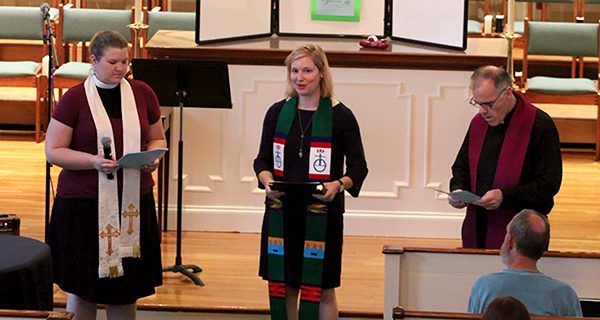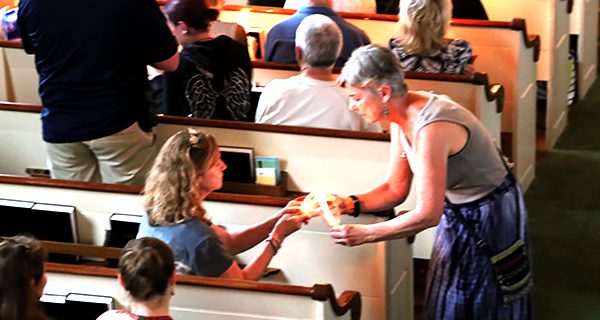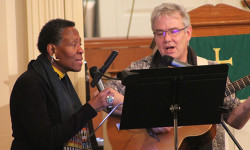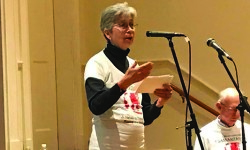[ccfic caption-text format="plaintext"]
By Gabe Stern
Hometown Weekly Intern
A photo memory board sat at the center of the United Church’s stage last Wednesday, July 12. Two large candles framed either side of the board. As community members filed into the church and found their seats, a few went up to the front and pinned pictures of loved ones that they had lost to addiction.
This was the beginning of a candlelight vigil, held in memory of those who have passed away because of the opioid epidemic in the Walpole community. At 7 p.m, Reverend Anna Flowers spoke to the congregation and expressed gratitude to the Walpole Coalition for Alcohol and Drug Awareness for sponsoring the event, and to the various speakers who had volunteered to share their stories with the community.
For the town of Walpole, this vigil had been a long time coming. Since 2011, 149 overdoses of opioid drugs have been reported to the Walpole police, including 28 drug or alcohol related deaths. In many ways, this reflects the toll that the epidemic has taken in Massachusetts as a whole. The Commonwealth has the highest rate of opioid-related hospital visits out of the 30 states that have been recorded, and 40% of Massachusetts residents know someone who has been affected by drug addiction.
Members of the WCADA stood at the front of the church prior to the vigil, holding a basket of candles for attendees to take. Midway through the vigil, the candles were lit as the age and gender of the 28 victims of drug/alcohol overdose were read by Walpole police Chief John Carmichael.In addition to mourning for those who passed, the vigil gave the community an opportunity to offer a support system for community members currently going through their own addiction issues, and to fight the stigma that so often comes with drug abuse.
“Our message tonight is to stop the stigma and stop the addiction and we think those two things go hand in hand” said Reverend Anna Flowers. She pointed out that the fear and shame that come with admitting to addiction often hold back victims from getting the help they need. She added that to rid the stigma of opioid abuse, the community would have to come together to support those in need. “We’re going to be a community that binds together and is stronger and is going to face this together,” Flowers explained.
Board of Selectmen Chairman Eric Kraus was the first to speak. He highlighted the devastating toll that opioid use has on the Walpole community and the personal toll that this has caused him.
“It breaks my heart each and every time we lose someone to addiction.”
Despite this, Kraus was quick to point out the new efforts to stop addiction initiated by the Walpole Coalition for Alcohol and Drug Awareness, including new training for coaches to help athletes with addiction, and increased guidance for parents on how to identify signs of addiction with their children.
Walpole Chief of Police John Carmichael, who has dealt with several firsthand cases of opioid overdoses, spoke as well, highlighting how no one is immune to addiction.
“These people are our neighbors, our fellow citizens and even our loved one ¬ it’s not a character flaw, it’s not a lifestyle, these are environmental factors, biological factors that are involved, and something that people can’t control.”
Scott Sandvos, who’s son, Will, died of a heroin overdose three years ago, was also in attendance. Sandvos described himself as a hands-on parent, but he said the signs were difficult to read for fighting what seemed like an “unbeatable opponent.”
He said the best way to combat addiction is through vigilance.
“Please speak up if you see someone going down the wrong path. You’re not betraying their trust, you’re potentially saving their life … There’s no time to wait.”
“Do it for Will and all the others … Where there’s a will there’s a way”
Along with an audience of nearly 100, there were also several organizations to help fight drug addiction in attendance. Learn to Cope, an organization that helps the families of drug addicts, had a table set up along with a mental health facility in Walpole that had it’s own separate table.
“…We want to say that we’re here for you, that there are resources in our community, and [we’re here to] get you the help you need,” said Robin Chapell, who is the head of the Walpole Coalition for Alcohol and Drug Awareness and the Health director for Walpole.
For a while after the vigil concluded, many stayed to mingle with other community members or to take a moment for themselves. Despite the solemn atmosphere, many greeted friendly faces among the crowd. This vigil symbolized a renewed effort to eliminate the shame in asking for clinical help while going through drug addiction.
As Scott Sandvos said to the grieving audience, “Let’s let this night be the beginning of something positive.”
If you know anybody that is struggling with addiction, contact The Walpole Coalition for Alcohol and Drug Awareness, “Learn to Cope”, or other resources throughout the town of Walpole.


























